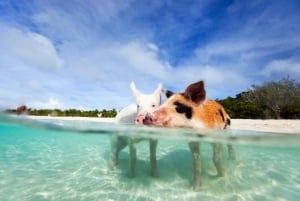Mayaguana
At the southeast corner of the archipelago, Mayaguana is a place where mail, care packages of food and clothing, and other necessities come to the island once a week on the slow sailing mail boat. This is a place where neighbours can hear each other laugh through their kitchen windows, smell dinner cooking three houses down, and light up a pipe and reminisce on the front porch of cousin Amos’ house. That’s because only three hundred and twelve people make up three main fishing villages, Pirate’s Well, Abraham’s Bay, and Betsy’s Bay, all close knit communities who have learned to enjoy their own company and the natural elements even more than a good movie.
Mayaguana is the most remote of all Bahamian islands: It is a place where fishing, diving for conch and farming the land are major livelihoods; after the sun goes down, stories are still told to light up the night. This is a place where medicinal plants make up a good portion of the medicine chest, where bush teas rival Liptons, where the colour of the setting sun tells of wind or rain to come, and where land, sea and people live in a symbiotic relationship that can’t be taken for granted. This is a place where doors are left unlocked.
Like its name, unchanged since the Lucayans spoke it, Mayaguana has undergone little transformation since its earliest days of Spanish ownership and later English and African settlement. This means that for the traveler looking for an out of the way, off the beaten path, road less traveled kind of place, Mayaguana is just that.
Picnic and gather shells or driftwood on exquisite beaches, like Horse Pond Beach, that stretch for miles along Mayaguana’s western shores; swim or snorkel in aquamarine waters and discover for yourself the thriving life of coral reefs; or hike into forests thick with indigenous trees and plants, including the Bahamas national tree, the Lignum Vitae, latin for ‘tree of life’.
Explore wildlife on an outcropping of limestone southeast of mainland Mayaguana, on Booby Cay, where you’ll find flocks of brown Booby, rock iguanas and wild goats. The nearly extinct Hutia, a cross between a rabbit and a rat, are also native to Mayaguana and harken back to the days of the indigenous Lucayans, who were known to hunt the Hutia and cook it up in their staple pepperpot soup. Today, duck are hunted rather than the hutia, which may account for why the hutia are making a strong comeback.
And when it’s time for dinner, take a walk to one of the several down home eateries or one of the local resort restaurants at Pirates Well or Abraham’s Bay, where you’ll find dishes made from freshly caught fish and land crabs, or a version of conch salad found nowhere else in the archipelago – boiled conch instead of raw, in a mayonnaise based salad.
